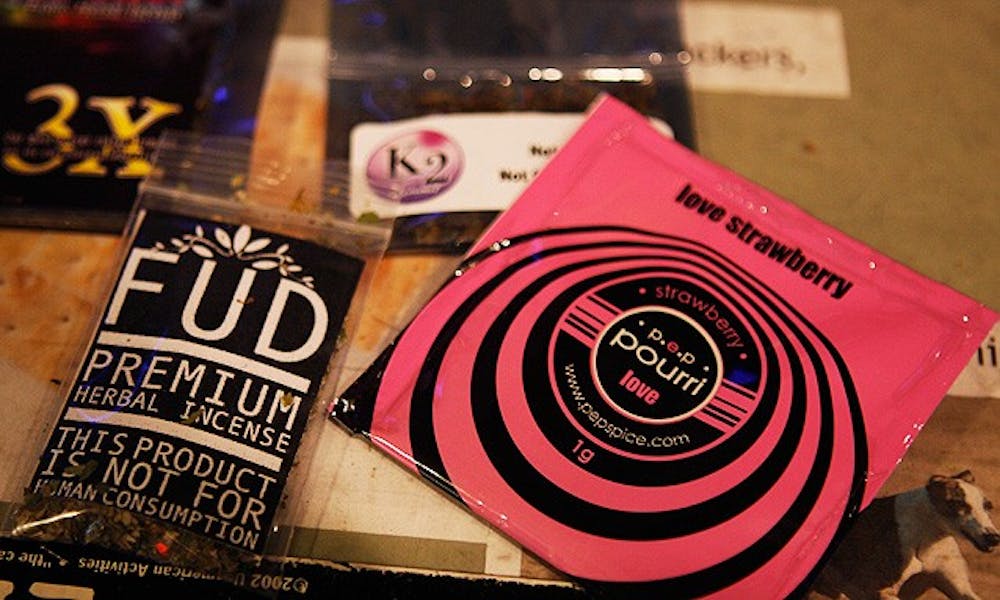Although alcohol remains Duke students’ drug of choice, some undergraduates have recently experimented with a new, “legal weed.”
K2—also known as spice, genie and zohal—is a leafy green, synthetic drug said to have effects similar to marijuana. Often marketed as incense, the drug began appearing in U.S. tobacco shops and convenience stores in late 2009.
Serious concerns about the drug have emerged in the last year after more than 500 reports were made to poison control centers across the country, according to The (Raleigh) News & Observer. Side effects have allegedly included hallucinations, elevated heart rates, vomiting and seizures.
Despite a warning label noting the product is not meant for human consumption, college students have reportedly been smoking K2 in dorm rooms across the country.
“Something you’re not supposed to smoke”
Students say that though some of their peers have experimented with the drug, few have become regular users—its reputation as an alternative to marijuana may not be deserved.
“I think a lot more people were doing it last year,” said sophomore Will Chappell. “They were trying to give it a chance because they didn’t really know what it was.”
Smoking K2 as a substitute for marijuana has left some students disappointed. Chappell said K2 is “nowhere near as good as weed” and that he experienced an “angry high” from the drug that put him in a bad mood. Sophomore Scott Spencer said K2 had “a bad psychological effect” on him and made him feel paranoid.
Despite their unpleasant experiences, Chappell and Spencer agreed that K2 does bear some resemblance to its illicit counterpart. Spencer said the cost of K2 is comparable to that of certain kinds of marijuana, noting that the new product sells for about $15 to $20 per gram.
However, both students said they are wary of the substance’s synthetic origins.
“It’s synthesized, and it’s made from something you’re not supposed to smoke,” Chappell said, adding that he prefers not to smoke K2 because he believes it is worse than marijuana for his health.
Spencer also said K2 is not a drug he would choose to smoke often, particularly on Duke’s campus.
“If marijuana was legal, I don’t think you’d ever find someone who would prefer K2 to marijuana,” he said. “And there’s a low enough risk of getting in trouble with marijuana that it’s essentially legal on campus.”
Students seeking to try K2 normally find it readily accessible. In addition to its availability online, Chappell said last spring some students purchased the drug from Expressions, an adult and tobacco store located in Chapel Hill.
The store no longer sells the product, an employee told The Chronicle, but students say that Hazmat, a tobacco shop in Chapel Hill, sells K2. The store’s employees declined to comment on the product, noting that they were told not to talk to the media about K2 after the store’s recent appearance in a newspaper about the drug.
Unknown among administrators
Because K2 is still a legal substance in North Carolina, it is difficult for administrators to monitor.
Typically, administrators learn about drug use through situations in which students are being reprimanded, said Tom Szigethy, associate dean for students and director of the Alcohol and Substance Abuse Prevention Center . K2 is therefore more difficult to monitor.
“We’ve not seen a spike of students telling us about [K2],” Szigethy said. “The most common drug of choice, of course, is alcohol, and I would say that [marijuana] is second on the list.”
Jean Hanson, assistant director for Student Health, said there have been no known cases of Duke students being hospitalized due to the drug’s adverse side effects.
“I am not familiar with K2 and have seen no references to it in reports from the [emergency department],” she wrote in an e-mail. “I do not even know if there is a specific test for it.”
Szigethy said that in many cases, bad experiences with drugs offer an educational moment to students, allowing them to consider the reasons they felt it necessary to use the substance in the first place.
“There can [still] be implications if they kind of skirt the law—there can be negative implications on their life choices,” he said. “They’re using [drugs like K2], and... they have no idea about the long-term implications of using this substance.”
In light of its reported adverse effects, researchers at Saint Louis University, Harvard University and the University of Massachusetts have teamed up with the federal Centers for Disease Control and the Missouri Department of Health and Senior Services to study how K2 affects the human body, the Associated Press reported in March.
Although K2 is still legal in many parts of the country, some states—such as Kansas and Kentucky—have banned the drug. Several other states are in the process of outlawing the product.
Get The Chronicle straight to your inbox
Signup for our weekly newsletter. Cancel at any time.

